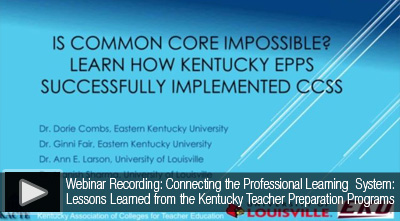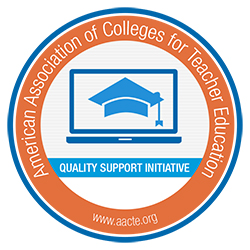10 Nov2015
By Amanda Lester and Omar Davis
Please join AACTE November 17 for a free webinar highlighting three AACTE member and partner initiatives that are developing strategies and action to increase diversity in the teaching workforce.
A recent report by the Albert Shanker Institute, The State of Teacher Diversity in American Education, identifies teacher diversity in our nation’s schools as “an educational civil right for students” that is not adequately represented in the current educator workforce. In AACTE’s webinar, “Advancing Diversity in the Teaching Workforce: Three Initiatives Working Toward Solutions,” participants in three initiatives will “tell the story” of their work, providing the background for their initiative, the key issues and challenges they are addressing, and the progress they have made to identify solutions.
05 Nov2015
By Sharon Robinson

As the Common Core State Standards (CCSS) and their kindred iterations continue to gain traction in schools around the country, staff development efforts have been bringing in-service educators up to speed, and colleges of education have been adjusting their curricula to ensure that the field’s newest professionals are also ready for the new standards. Nowhere has this shift seen greater success than in Kentucky, which was the first state to adopt and implement CCSS. A recent AACTE webinar sponsored by the Learning First Alliance’s “Get It Right” campaign highlighted the remarkable progress made by institutions in the state.
03 Nov2015
By Mark LaCelle-Peterson
What do teachers and school leaders need to know about assessment, and how are preparation programs helping preservice educators to develop assessment literacy? And once program completers are employed, how can school districts support their ongoing growth?
To explore these questions, Northwest Evaluation Association (NWEA) has established a Task Force on Assessment Education for Teachers, on which I serve along with others involved in preservice and in-service educator preparation. And we want to hear from you!
03 Nov2015
By Christine DeGregory
 If you have been inspired by the previous Research-to-Practice Spotlight videos featuring the robust partnership between Colorado State University (CSU) and the Poudre School District (PSD) in Fort Collins, don’t miss the newest installment in the series, in which school and university officials share advice on how to implement a successful clinical practice model.
If you have been inspired by the previous Research-to-Practice Spotlight videos featuring the robust partnership between Colorado State University (CSU) and the Poudre School District (PSD) in Fort Collins, don’t miss the newest installment in the series, in which school and university officials share advice on how to implement a successful clinical practice model.
Utilizing a professional development school approach, CSU and PSD have created an intentional, collaborative endeavor to achieve their shared mission of preparing highly qualified and effective teachers.
03 Nov2015
By Angela Maynard Sewall
What are the assessment and evaluation challenges related to the development of great principals? A free webinar next week will explore the assessment of progress, the benefit of standards, and outcomes that have led to change and greater focus on the preparation and professional development of school leaders in the Wallace Foundation’s Principal Pipeline Initiative.
On Thursday, November 12, the third webinar in AACTE’s series on the initiative will feature the following participants:
03 Nov2015
By Susan Korach
While the impact of partnerships is not yet fully understood, there is a growing body of evidence that suggests that school districts that partner with local principal training providers are more likely to leverage programmatic changes that result in principals who are better equipped to lead schools to improve student performance.
— Cheryl King, Quality Measures: Partnership Effectiveness Continuum (2014)
Last month, I had the privilege of joining colleagues from around the country to present an AACTE webinar about building school-university partnerships to support stronger preparation of school leaders. A recording of the webinar is now available here.
03 Nov2015
By Hannah Maes

The immediate value of taking part in AACTE’s Online Professional Seminars is obvious: You get to enhance your peer network while gaining knowledge on crucial issues in the field, from assessment and data use to quality assurance systems and the nuts-and-bolts of preparing for national or regional accreditation. But there are other, long-term advantages to participating in the seminars offered through AACTE’s Quality Support Initiative.
The OPSs provide a framework that allows you and your institution to focus on your faculty. The professional development offered through the seminars strengthens your performance in your current position and prepares you for future ones. By developing participants’ skills regarding assessment and accreditation, the OPS series builds individuals’ confidence and enhances their competence.
03 Nov2015
By Jerrica Thurman

Ed Prep Matters is featuring “Stories of Impact” to showcase AACTE member institutions with educator preparation programs that are making a positive impact in their communities and beyond through innovative practices. We are committed to sharing members’ success stories and encourage you to do the same.
Schools of education across the country take a variety of innovative approaches to improving the preparation of teachers in partnership with local schools. One example that recently won the attention of a local news channel is a lab school of Butler University (IN), which is part of the state’s largest school district, Indianapolis Public Schools (IPS). Providing its elementary students a unique opportunity to guide their own learning, this school is centered on the Reggio Emilia approach—a project-based style of teaching and learning designed to build students’ critical thinking and democratic ideas.
02 Nov2015
By Teri Langlie
Minnesota requires all teacher candidates to take edTPA as part of the state’s program review and approval process. At the state’s annual edTPA conference October 7, educators from across the state joined in invigorating conversations about the changes the assessment has spurred and the common language it has given educators to communicate about effective teaching.
During the session I helped moderate on how programs can use edTPA components and candidate performance data to “back map” their course work, the exchange was both lively and informative. Panelists shared stories about how they are getting edTPA performance data to more faculty, identifying needs, and developing instructional resources such as new observation rubrics that adjunct faculty can use to better understand teaching skills that edTPA asks candidates to demonstrate.









